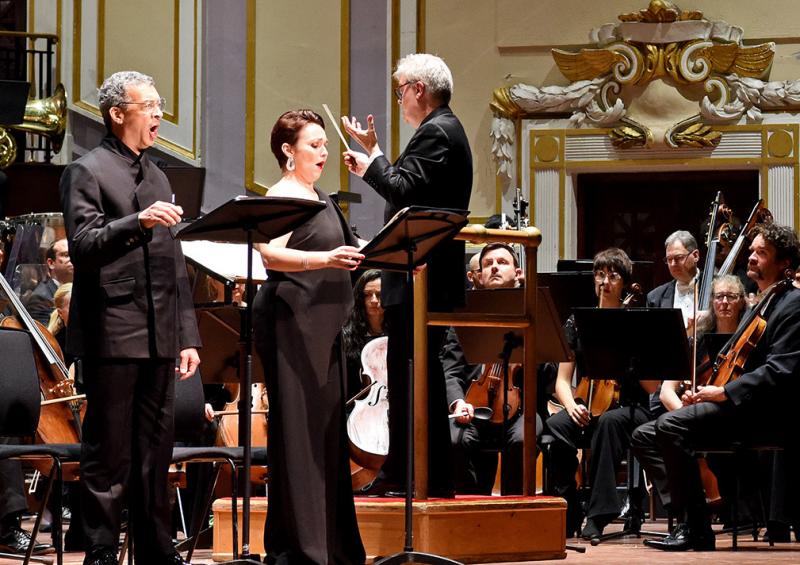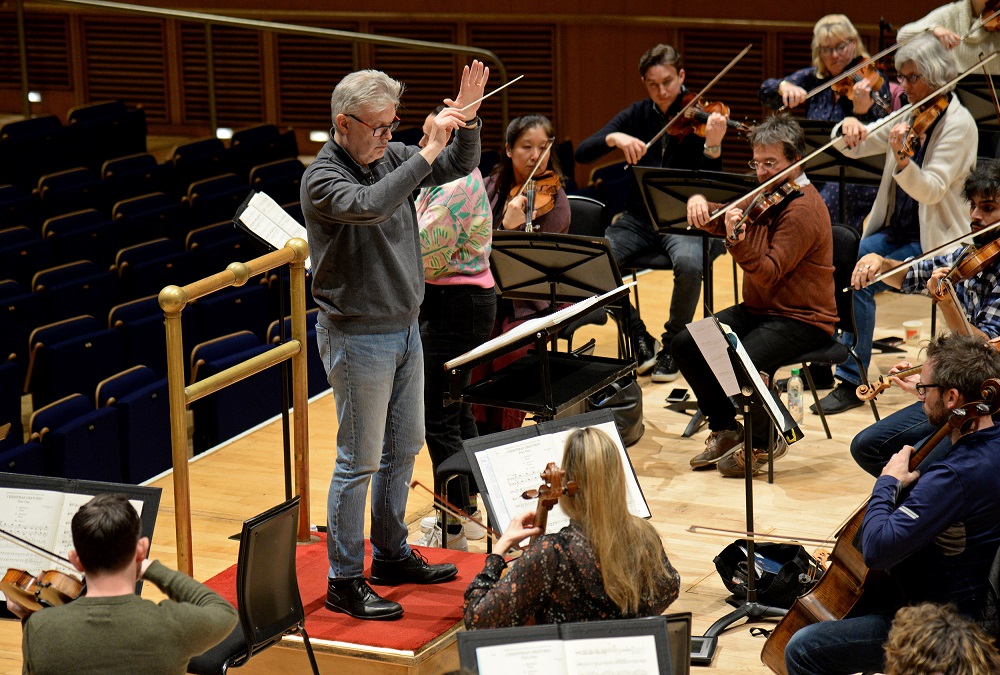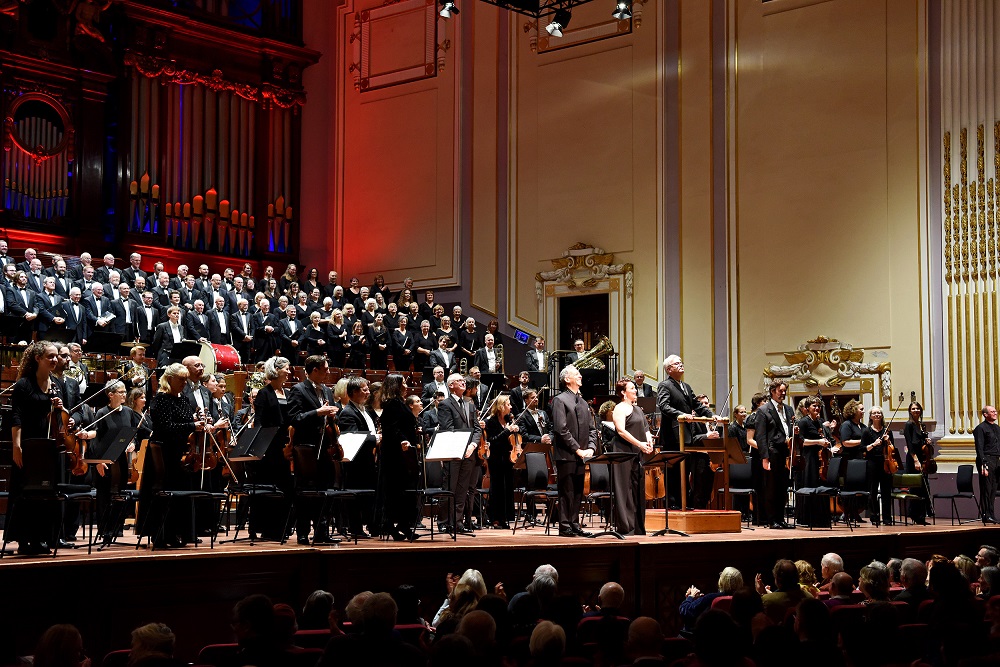MacMillan's Christmas Oratorio, Lois, Williams, RSNO, MacMillan, Usher Hall, Edinburgh – a great composer at the top of his game | reviews, news & interviews
MacMillan's Christmas Oratorio, Lois, Williams, RSNO, MacMillan, Usher Hall, Edinburgh – a great composer at the top of his game
MacMillan's Christmas Oratorio, Lois, Williams, RSNO, MacMillan, Usher Hall, Edinburgh – a great composer at the top of his game
Scottish premiere of a recent masterwork

It is not every day that a new choral work by a living composer can confidently be labelled a masterpiece. Yet this is what we have here. James MacMillan’s Christmas Oratorio is still sufficiently freshly-minted to be receiving its Scottish premiere, and from Friday night’s spectacular performance by the Royal Scottish National Orchestra and Chorus it deserves to sit alongside Messiah or Bach’s eponymous masterpiece as a staple of our future Christmas repertoire.
From the first stuttering notes of the opening Sinfonia, with the celesta casting a fairy tale spell over chewy woodwind chords, there is scarcely an unoriginal thought in the one hundred or so minutes that elapse before the remarkable conclusion. There are references galore: cluster chords reminiscent of Prokofiev, glimpses of English pastoralism, hazy impressionist choral interweaving in the Chorus O magnum mysterium, and grandiloquent Straussian swellings in the lower brass, but the voice throughout is unmistakeably MacMillan’s own, fiercely honest, never predictable, and assembled with a dextrous command of orchestral sonorities.
The work is cast in precise symmetry: two palindromic halves, each consisting of an opening orchestral sinfonia, a chorus, aria, tableau, aria, chorus and a final sinfonia. MacMillan has always been acutely aware of injustice and unfairness, so with this structure everyone gets a fair crack of the whip, even if it means that he denies himself a grand choral peroration at the end.  The composer himself (pictured above in Glasgow rehearsal with the RSNO) conducted what he describes as a “modest” orchestra, in that it did not completely fill the Usher Hall stage, but one that packs a heavy punch, capable of blistering crescendi and characteristically violent eruptions of brass and percussion, with unusual prominence for the low rumblings of tuba and bass drum. But for the most part, this is a softer, gentler MacMillan than the young firebrand who shocked us all decades ago with the relentless violence of The Confession of Isobel Gowdie or The Exorcism of Rio Sumpul. Some of the finest writing in this Christmas Oratorio are the moments of lustrous delicacy, such as the improbable juxtaposition of solo violin and chorus in the second chorus Hodie Christus natus est, or the final choral setting of a Gaelic lullaby with a solo harp as accompaniment.
The composer himself (pictured above in Glasgow rehearsal with the RSNO) conducted what he describes as a “modest” orchestra, in that it did not completely fill the Usher Hall stage, but one that packs a heavy punch, capable of blistering crescendi and characteristically violent eruptions of brass and percussion, with unusual prominence for the low rumblings of tuba and bass drum. But for the most part, this is a softer, gentler MacMillan than the young firebrand who shocked us all decades ago with the relentless violence of The Confession of Isobel Gowdie or The Exorcism of Rio Sumpul. Some of the finest writing in this Christmas Oratorio are the moments of lustrous delicacy, such as the improbable juxtaposition of solo violin and chorus in the second chorus Hodie Christus natus est, or the final choral setting of a Gaelic lullaby with a solo harp as accompaniment.
There are prominent roles for soprano and baritone soloists, here confidently filled by Rhian Lois and Roderick Williams in eloquent settings of John Milton, Robert Southwell and John Donne, but heard to greatest dramatic effect in the quasi-theatrical setting of the first tableau, which tells the unfailingly chilling story of Herod’s massacre with unflinching honesty.  This is not a chronological account of the nativity story – the closest we get to that is the Herod tableau – but a collection of meditations and inspirations drawn from literature and scripture. It reflects, of course, MacMillan’s deep Christian faith, but is nonetheless a secular work designed for the concert hall, not a liturgical setting. It is not a contradiction of my opening sentence to add that this is not a flawless work. After the breathless energy of the first half, particularly the richly imaginative choral Hodie setting, the gentler second half seems rather more diffuse, with a reflective quality that undermines the sense of propulsion.
This is not a chronological account of the nativity story – the closest we get to that is the Herod tableau – but a collection of meditations and inspirations drawn from literature and scripture. It reflects, of course, MacMillan’s deep Christian faith, but is nonetheless a secular work designed for the concert hall, not a liturgical setting. It is not a contradiction of my opening sentence to add that this is not a flawless work. After the breathless energy of the first half, particularly the richly imaginative choral Hodie setting, the gentler second half seems rather more diffuse, with a reflective quality that undermines the sense of propulsion.
The final Chorus, for example, is a simple Gaelic setting that cries out for an elaboration that doesn’t come, just as the final Sinfonia appears to build towards a magnificent brass chorale but stops short with two cheeky punctuation marks. But many are the masterpieces that have happily outlived their minor imperfections, for much of what we hear in a piece of music is influenced by what we are accustomed to, and if we are given the chance we will get to love and cherish this great piece of musical creativity for all its quirks and unpredictability.
rating
Explore topics
Share this article
more Classical music
 Queyras, Philharmonia, Suzuki, RFH review - Romantic journeys
Japan's Bach maestro flourishes in fresh fields
Queyras, Philharmonia, Suzuki, RFH review - Romantic journeys
Japan's Bach maestro flourishes in fresh fields
 Classical CDs: Swans, hamlets and bossa nova
A promising young pianist's debut disc, plus Finnish mythology and a trio of neglected British composers
Classical CDs: Swans, hamlets and bossa nova
A promising young pianist's debut disc, plus Finnish mythology and a trio of neglected British composers
 Christian Pierre La Marca, Yaman Okur, St Martin-in-The-Fields review - engagingly subversive pairing falls short
A collaboration between a cellist and a breakdancer doesn't achieve lift off
Christian Pierre La Marca, Yaman Okur, St Martin-in-The-Fields review - engagingly subversive pairing falls short
A collaboration between a cellist and a breakdancer doesn't achieve lift off
 Ridout, Włoszczowska, Crawford, Lai, Posner, Wigmore Hall review - electrifying teamwork
High-voltage Mozart and Schoenberg, blended Brahms, in a fascinating programme
Ridout, Włoszczowska, Crawford, Lai, Posner, Wigmore Hall review - electrifying teamwork
High-voltage Mozart and Schoenberg, blended Brahms, in a fascinating programme
 Sabine Devieilhe, Mathieu Pordoy, Wigmore Hall review - enchantment in Mozart and Strauss
Leading French soprano shines beyond diva excess
Sabine Devieilhe, Mathieu Pordoy, Wigmore Hall review - enchantment in Mozart and Strauss
Leading French soprano shines beyond diva excess
 Špaček, BBC Philharmonic, Bihlmaier, Bridgewater Hall, Manchester review - three flavours of Vienna
Close attention, careful balancing, flowing phrasing and clear contrast
Špaček, BBC Philharmonic, Bihlmaier, Bridgewater Hall, Manchester review - three flavours of Vienna
Close attention, careful balancing, flowing phrasing and clear contrast
 Watts, BBC Symphony Orchestra and Chorus, Bignamini, Barbican review - blazing French masterpieces
Poulenc’s Gloria and Berlioz’s 'Symphonie fantastique' on fire
Watts, BBC Symphony Orchestra and Chorus, Bignamini, Barbican review - blazing French masterpieces
Poulenc’s Gloria and Berlioz’s 'Symphonie fantastique' on fire
 Bell, Perahia, ASMF Chamber Ensemble, Wigmore Hall review - joy in teamwork
A great pianist re-emerges in Schumann, but Beamish and Mendelssohn take the palm
Bell, Perahia, ASMF Chamber Ensemble, Wigmore Hall review - joy in teamwork
A great pianist re-emerges in Schumann, but Beamish and Mendelssohn take the palm
 First Persons: composers Colin Alexander and Héloïse Werner on fantasy in guided improvisation
On five new works allowing an element of freedom in the performance
First Persons: composers Colin Alexander and Héloïse Werner on fantasy in guided improvisation
On five new works allowing an element of freedom in the performance
 First Person: Leeds Lieder Festival director and pianist Joseph Middleton on a beloved organisation back from the brink
Arts Council funding restored after the blow of 2023, new paths are being forged
First Person: Leeds Lieder Festival director and pianist Joseph Middleton on a beloved organisation back from the brink
Arts Council funding restored after the blow of 2023, new paths are being forged
 Classical CDs: Nymphs, magots and buckgoats
Epic symphonies, popular music from 17th century London and an engrossing tribute to a great Spanish pianist
Classical CDs: Nymphs, magots and buckgoats
Epic symphonies, popular music from 17th century London and an engrossing tribute to a great Spanish pianist
 Sheku Kanneh-Mason, Philharmonia Chorus, RPO, Petrenko, RFH review - poetic cello, blazing chorus
Atmospheric Elgar and Weinberg, but Rachmaninov's 'The Bells' takes the palm
Sheku Kanneh-Mason, Philharmonia Chorus, RPO, Petrenko, RFH review - poetic cello, blazing chorus
Atmospheric Elgar and Weinberg, but Rachmaninov's 'The Bells' takes the palm

Add comment